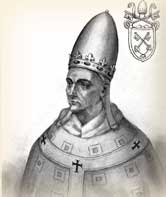 This day, March 28, 1288 was Easter. As could be expected,
Rome, the center of Western Christianity, was electric with a sense of
importance. Easter has always been the most significant day in the
church calendar, the day on which Christ was vindicated by rising in
triumph from the grave. The day calls for special celebrations,
especially in Rome.
This day, March 28, 1288 was Easter. As could be expected,
Rome, the center of Western Christianity, was electric with a sense of
importance. Easter has always been the most significant day in the
church calendar, the day on which Christ was vindicated by rising in
triumph from the grave. The day calls for special celebrations,
especially in Rome.The occasion was charged with more than the usual significance this time, however. It would be the first time that Girolamo Masci celebrated Easter in the capacity of pope. Newly-elected, he had taken the name Nicholas IV. Adding to the importance of the occasion was the presence of Rabban Bar Sauma, an enthusiastic envoy from the Far East.
Bar Sauma was a Nestorian, a member of an ancient sect of Christians. Born near Beijing, he traveled West to visit Jerusalem shortly after Marco Polo arrived in the East. In the Mideast, Bar Sauma was delegated to act as ambassador for newly-elected Patriarch Mar Yabahalla III. But there was no pope in Rome, so negotiations could not be completed. Bar Sauma seized the opportunity to pass on to France and possibly England. A partial record of his travels has come down to us.
Back in Rome, the ambassador found Nicholas IV now installed as pope. Nicholas received him with open arms. He allowed Bar Sauma to celebrate the Eucharist. And when the onlookers had seen his actions, they rejoiced and said, "The language is different, but the use is the same."
On Palm Sunday, the pope gave Bar Sauma the Eucharist in front of a throng of tens of thousands, roaring their amens so that the ground shook. "And Rabban Sawma rejoiced greatly in receiving the Eucharistic Mystery from the hand of Mar Papa. And he received it with tears and sobs, giving thanks to God and meditating upon the mercies which had been poured out upon him."
Today's Easter service was almost an anti-climax. "And on the day of the Sunday of the Resurrection Mar Papa went to the holy church of my Lady Mary. And he and the Cardinals, and the Metropolitans, and the Bishops, and the members of the congregation saluted each other, and they kissed each other on the mouth, and he celebrated the Mysteries, and they receive Eucharistic Mystery, and then he returned to his Cell. And he made a great feast, and infinite gladness."
Soon afterwards, Bar Sauma asked permission to return to his own people. The pope wanted to keep the old man, but Bar Sauma reminded him that he had obligations to those who sent him. The Asian Christian also pleaded that he might be allowed to take back a few relics. Nicholas gave him a fragment of cloth reputed to be from Mary's scarf as well as small pieces from the bodies of saints. Nicholas also furnished him with gold for his journey.
Back in Persia, Bar Sauma, with the help of the king, built a church to house the relics. When he died, his body was buried beside that church.
Bibliography:
- Budge, E.A. Wallis. The Monk of Kublai Khan, Emperor of China; or The History of the Life and Travels of Rabban Sawma, Envoy and Plenipotentiary of the Mongol Khans to the Kings of Europe and Markos who as Yahbh-Allaha III Became Patriarch of the Nestorian Church in Asia. London: The Religious Tract Society, 1928.
- Montgomery, James A. The History of Yaballaha III, Nestorian Patriarch and of his Vicar Bar Sauma, Mongol Ambassador to the Frankish Courts at the end of the 13th century. New York: Octagon, 1966.
- Outerbridge, Leonard M. The Lost Churches of China. Philadelphia: Westminster Press, 1952.
- "Rabban Bar Sauma." Encyclopedia Britannica 1911.